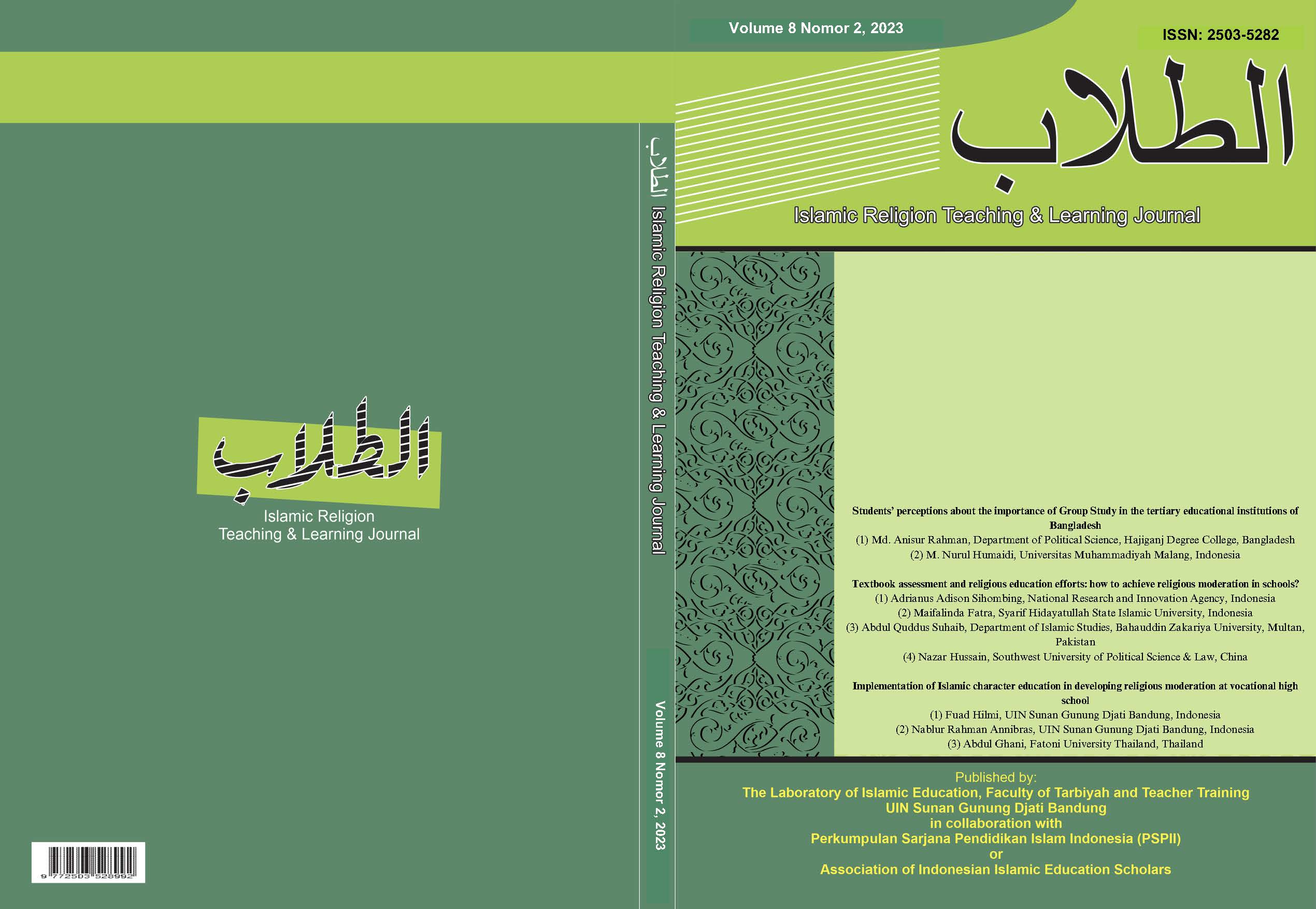The role of government institutions, social institutions and public space in forming community character
DOI:
https://doi.org/10.15575/ath.v8i2.30172Keywords:
Community Character, Government Institutions, Public Space, Social Institutions, The RoleAbstract
The purpose of this study is to examine how the character education form is being implemented in society with a particular emphasis on the function of governmental, social, and public institutions. In this study, we use the qualitative research method with a literature study approach to better understand the role that public spaces, social organizations, and governmental bodies play in character education and how that role affects the development of good character in society. This study explores the perspectives of many stakeholders in the application of character education bentuks in society using data collection approaches from various documentations, including journals and document analysis. It is anticipated that this study's findings will help people better comprehend the significance of the role that governments play in society. The study emphasizes the crucial role of active involvement from government institutions, social institutions, and public spaces in shaping good character in society. The research results are expected to provide a profound understanding of the positive impact that can result from the active engagement of these entities. Thus, the research aims to fill knowledge gaps related to the implementation of community-based character education. The conclusion of this research reflects the urgency of collaborative efforts between the government, social institutions, and public spaces in shaping positive character values, ultimately enhancing the overall quality of life in society.
Penelitian ini bertujuan untuk menyelidiki implementasi bentuk pendidikan karakter berbasis masyarakat, dengan fokus pada peran institusi pemerintah, institusi sosial, dan ruang-ruang publik. Metode penelitian kualitatif dengan pendekatan analisis deskriptif merupakan pisau yang kami gunakan dalam penelitian ini guna memahami secara mendalam bagaimana institusi pemerintah, institusi sosial, dan ruang-ruang publik terlibat dalam pendidikan karakter, serta dampak yang ditimbulkan dalam membentuk nilai-nilai karakter yang positif dalam masyarakat. Penelitian ini menggunakan metode kualitatif dengan pendekatan studi literatur seperti jurnal serta analisis dokumen untuk menggali perspektif berbagai pemangku kepentingan dalam implementasi bentuk pendidikan karakter di masyarakat. Hasil penelitian ini diharapkan dapat memberikan pemahaman yang lebih baik tentang pentingnya peran institusi pemerintah, institusi sosial, dan ruang-ruang publik dalam membentuk karakter yang baik dalam masyarakat. Penelitian ini menggarisbawahi pentingnya peran aktif institusi pemerintah, institusi sosial, dan ruang-ruang publik dalam membentuk karakter yang baik dalam masyarakat. Hasil penelitian diharapkan memberikan pemahaman mendalam tentang dampak positif yang dapat dihasilkan oleh keterlibatan aktif dari pihak-pihak tersebut. Dengan demikian, penelitian ini bertujuan untuk mengisi kesenjangan pengetahuan terkait implementasi pendidikan karakter berbasis masyarakat. Simpulan penelitian ini mencerminkan urgensi peran bersama pemerintah, institusi sosial, dan ruang-ruang publik dalam membentuk nilai-nilai karakter yang positif, yang pada gilirannya dapat meningkatkan kualitas hidup masyarakat secara keseluruhan.
References
Ainiyah N., (2013). Pembentukan Karakter Melalui Pendidikan Agama Islam. Jurnal Al-Ulum. Volume. 13 Nomor 1, Juni 2013. Hal 25-38
Saat S., (2013). Pendidikan Sebagai Institusi Sosial. Lentera pendidikan, vol. 16 no. 2
Handayani S., Sulastini R., (2023). Implementasi Pendidikan Karakter melalui Lingkungan Sebagai Ruang Edukasi dalam Membangun Self Awareness dan Self Respect. Journal on Education. Volume 05, No. 04. pp. 15956-15966. E-ISSN: 2654-5497, P-ISSN: 2655-1365. Website: http://jonedu.org/index.php/joe
Masitha S., Ramadhan R., Ali A. S., Tito D. P., Imsar. (2022). Implementasi Pendidikan Karakter Melalui Organisasi Karang Taruna Dalam Mewujudkan Masyarakat Madani Di Desa Galang Suka Kecamatan Galang. MARTABE : Jurnal Pengabdian Masyarakat. Volume 5 Nomor 8 Tahun 2022. DOI : 10.31604/jpm.v5i8.2844-2853. p-ISSN: 2598-1218. e-ISSN: 2598-1226
Musianto, Lukas. S. (2002). Perbedaan Pendekatan Kuantitatif dengan Pendekatan Kualitatif dalam Metode Penelitian. Jurnal Manajemen & Kewirausahaan Vol. 4, No. 2, September 2002: 123 – 136, Petra Christian University.
Pertiwi W. H. S., Weganofa R., (2015). Pemahaman Mahasiswa Atas Metode Penelitian Kualitatif: Sebuah Refleksi Artikel Hasil Penelitian. LiNGUA Vol. 10, No. 1, Juni 2015 • ISSN 1693-4725 • e-ISSN 2442-3823
Khoerudin L.A., Qomariah S., Sanjaya H., Supendi P. (2023). The Conceptual Model of Improving The Performance of Madrasah Teachers. ATTHULAB: Islamic Religion Teaching & Learning Journal. Vol. 8 No. 1
Aan Hasanah. (2013). Pendidikkan dalam Perspektif Karakter. Bandung: Insan Komunika.
Samani, M. (2011). Konsep dan Model Pendidikan Karakter. Bandung: Remaja Rosdakarya
Syamsul Kurniawan. (2013). Pendidikan Karakter: Konsepsi dan Implementasi Secara Terpadu diLingkungan Keluarga, Sekolah, Perguruan Tinggi dan Masyarakat. Yogyakarta:: Ar-ruzz Media.
Raco, Josef R. (2010). Metode Penelitian Kualitatif. Jakarta: Grasindo.
Parmonangan M. (2017). PROSIDING SCAN#8: “EDUCATION...PUTTING ECO-DNA IN OUR KIDS†Universitas Atma Jaya Yogyakarta, Yogyakarta, 19 Oktober 2017. ISBN: 978-602-8817-84-4
Downloads
Published
How to Cite
Issue
Section
License
Authors who publish with this journal agree to the following terms:
- Authors retain copyright and grant the journal right of first publication with the work simultaneously licensed under a Creative Commons Attribution-ShareAlike License that allows others to share the work with an acknowledgement of the work's authorship and initial publication in this journal.
- Authors are able to enter into separate, additional contractual arrangements for the non-exclusive distribution of the journal's published version of the work (e.g., post it to an institutional repository or publish it in a book), with an acknowledgement of its initial publication in this journal.
- Authors are permitted and encouraged to post their work online (e.g., in institutional repositories or on their website) prior to and during the submission process, as it can lead to productive exchanges, as well as earlier and greater citation of published work (See The Effect of Open Access).






